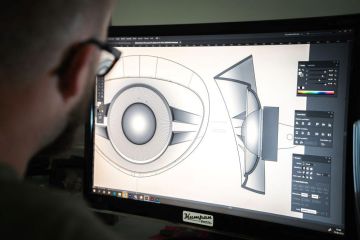Manufacturing & Design Engineering

The aim of this programme?
Delivered in partnership with Waterford and Wexford Education and Training Board (WWETB), the aim of this programme is to provide graduates with core skills and competency in mechanical 3D design, quality control, materials and finishing techniques, CNC machine programming andAdditive Manufacturing (AM). The graduates will also develop report writing and presentation skills as part of their applied work-based project, which will incorporate the application of their learning to their role within the company.
What will I study?
Students will learn the necessary skills to create 3D CAD models of a design, draft dimensioned drawings and evaluate both design and drawings for reductive manufacturing. The relevant document control and processes required from ISO9001:2015, Six Sigma and Lean quality systems are also incorporated into these activities. The fundamentals of Additive Manufacturing (AM) for both metals and polymers are introduced. This will include the assessment of 3D models for AM, generation of G-code and an analysis of the range of methods and techniques. Students will also develop the skills and knowledge required to program machines such as a mill, lathe, brake press, and laser cutting machine by Computer Numerical Control (CNC). CNC code management and revision history control accordingto the QMS is included in this section of the course.
An overview of typical engineering materials and their finishes in the context of material applications will be studied. Material mechanical properties, failure, and corrosion protection will be examined and discussed. Techniques such as shot blasting, surface grinding, and wear- and corrosion- resistant technologies are investigated. Finally, the work-based module will consolidate and integrate the learners knowledge, skills and competences across the range of subject areas. This module will provide learners with guidance and support to develop a work-based project where the technical aspects of the programme will be applied to the development of a technical solution/findings in a work-based environment.
Special Features?
This programme is delivered through hands-on training for a range of manufacturing processes. This programme has been designed for students with all levels of industry experience and candidates can apply for entry via the Institutes process of Recognition of Prior Learning (RPL). The programme will provide the engineeringknowledge behind each of manufacturing processes, allowing for greater operator input into the manufacturing workflow. This programme supports experienced operators with core mechanical engineering skills and provides a pathway for future education and academic advancement.
What will I be able to do when I finish this programme?
Graduates from this programme will have demonstrated the competence to complete a 30 credit programme at level 6. With this award they can apply for entry onto other flexible minor awards in engineering, for example, 3D CAD and Design or suitable Level 6 awards provided by the IoTs and Educational TrainingBoards. The programme has been designed with consideration of existing programmes allowing graduates to apply to participate in programmes such as year 1 of BEng in Mechanical Engineering and BEng in Aircraft Systems, where exemptions can be granted for the modules completed.
Entry Requirements
Typical participants on this programme are employees that have either manual or CNC machining experience. The programme will provide key skills in 3D design, CNC programming and quality control that will advance the operator from typical work setting operator to programming operator. For those seeking entry to the manufacturing sector, this programme provides the foundational requirements for these core manufacturing operations.
RPL (Recognition of Prior Learning)
All programmes are mapped to the SETU Carlow Recognition of Prior Learning (RPL) policyhttps://www.itcarlow.ie/resources/quality/quality-policies-procedures.htmand applicants who wish to apply using this route can request the specific RPL for this programme.
SETU Carlows RPL Policy offers clear pathways to the learner for recognition of previous learning undertaken and offer every credit to the learner in completing such learning.
The Programme Board will be responsible for the assessment of entry standards and applications as part of any RPL Process.

